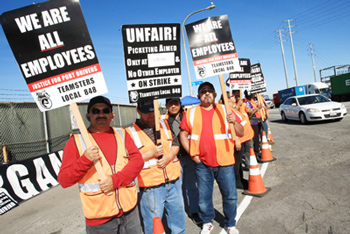

Vol. 78/No. 43 December 1, 2014

|
| Slobodan Dmitrov |
| Truckers at California ports struck Nov. 13, demanding end to bosses’ use of “independent contractor” label to pay them less and weaken union. Above, Nov. 17 picket at ITS Terminal. |
Short-haul port drivers at Pacific 9 Transportation Co. and Total Transportation Services Inc. began a strike Nov. 13, their fifth in the last year demanding union rights and fighting to tear down the bosses’ scheme to keep them divided and more exploitable as so-called independent contractors.
At the same time, members of the International Longshore and Warehouse Union — who have been working without a contract since July 1 — are calling attention to unsafe conditions on the docks and countering the shipping bosses’ propaganda campaign to blame the union for growing congestion at ports in Los Angeles and Oakland, California, and Seattle and Tacoma, Washington.
Since 2010 drayage drivers have been fighting for their right to join the Teamsters and have a steady paycheck. As “business owners” they are paid by the load with no compensation for waiting time and are responsible for costs of fuel, parking, insurance and maintenance, which sometimes results in negative “pay.”
A five-day strike in July involving 120 workers at three companies ended after Los Angeles Mayor Eric Garcetti negotiated a “cooling off” period and bosses pledged not to retaliate against drivers who took part.
Total Transportation Services nonetheless fired 35 strikers.
‘We’re realizing our power’
“We gave them some time, but they didn’t solve anything, so we restarted the strike,” Daniel Linares, a driver at Pacific 9 Transportation, told the Militant. “We’re realizing the power we have.”Workers set up pickets at the trucking companies in the morning Nov. 13, and sent teams to five terminals at the ports of Los Angeles and Long Beach to picket trucks from the companies.
Port bosses, fearing that pickets would back up traffic at the ports and expecting longshore workers would not cross any picket lines, refused to service trucks from the struck companies. Port Security guards turned away the scab trucks and sent away pickets.
“Nothing stands in the way of goods flowing through the Port of Los Angeles,” said Mayor Garcetti Nov. 13. The next day the picket lines were suspended, as the two companies and the Teamsters agreed to negotiate.
But on Nov. 17 the strike spread to three more companies — QTS Inc., LACA Express and WinWin Logistics, Inc. The next day workers picketed rail yards serviced by Pacer Cartage and Harbor Rail Transport, trucking companies that misclassify drivers as independent contractors.
Meanwhile, negotiations between the bosses’ Pacific Maritime Association and the ILWU have been stalled since a six-year contract covering 20,000 union members expired more than four months ago. Pressed to increased output under dangerous conditions, dockworkers are expressing concerns about safety as containers pile up. Shipping companies up and down the West Coast — backed by the big-business media — are accusing the union of carrying out a slowdown and hurting commerce ahead of holiday sales. An editorial in the Seattle Times, for example, carried the headline “U.S. Economy Calls for End of Port Slowdown.”
“The ILWU is not responsible for the current congestion crisis at West Coast ports,” a Nov. 10 press statement on the union website said. The causes of the congestion include “chassis shortage and dislocation; rail service delays, including a shortage of rail cars nationwide; the exodus of truck drivers who cannot make a living wage; long truck turn times; record retail import volumes (increases of 5.3 percent over 2013); larger vessels discharging massive amounts of cargo; container terminals pushed to storage capacities; and the peak shipping season (i.e., the August through October pre-holiday surge),” the statement said.
“Longshoremen are incredibly frustrated,” Craig Merrilees, ILWU spokesperson, told the Militant Nov. 17. “We began negotiations in May, but the companies aren’t taking the congestion problem seriously. They are making the docks more dangerous.”
“The men and women of the ILWU will not make up for the current supply chain failures at the expense of life and limb,” Merrilees said in a statement.
When longshore workers honored the port truckers’ pickets in July, an arbitrator ordered them back to work. A pretext for a similar ruling today may be more difficult for the bosses’ courts to defend now that the dockworkers themselves are working without a contract. “The ILWU has a long history of supporting workers’ struggles, and believes an injury to one is an injury to all,” Merrilees told the Militant.
Journal of Commerce editor Bill Mongelluzzo said Nov. 10 that Port of Oakland longshoremen this weekend “walked off their jobs for three consecutive shifts.” In discussions with the Militant, longshoremen explained that at the big Stevedoring Services of America terminal a wheel fell off a piece of equipment handling containers, creating a dangerous situation, so workers stood down until the equipment was repaired. Then, according to workers, bosses ordered the crew of some 100 ILWU members to leave the terminal, and suspended work for another shift.
Joel Britton in San Francisco contributed to this article.
Related articles:
Dupont bosses’ toxic leak in Texas kills 4 workers, threatens residents
On the Picket Line
Calif. Walmart workers rally for $15 an hour
Front page (for this issue) |
Home |
Text-version home